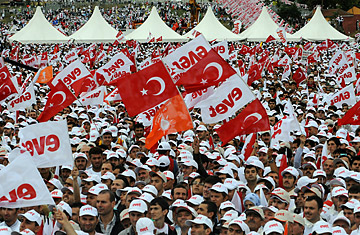
Supporters of Turkish Prime Minister and leader of the ruling Justice and Development Party, Recep Tayyip Erdogan, attend a rally in Istanbul.
Turks typically celebrate Eid, the end of the Ramadan month of Muslim fasting, with syrupy sweets, lengthy family meals and laid-back indulgence. But there has been nothing laid-back about this year's Eid, which comes on the eve of a bitterly divisive national referendum. Millions of Turks are due to vote on Sunday on a constitutional reform package that marks the latest chapter in a protracted power struggle over the country's future between the pious, tough-talking Prime Minister Recep Tayyip Erdogan and his secularist opponents. The referendum has turned into a vote of confidence on Erdogan and his mandate to govern, and fights have broken out between "Yes" and "No" voters across the country.
At issue is a series of changes the government is pushing that would increase civilian control over the military, broaden civil liberties and increase political involvement in the judiciary, currently a stronghold of secularist opposition. It is this last item that has stoked controversy. Many Turks who are wary of the government's motives argue that the changes will enable Erdogan to appoint religious conservatives to key posts.
That Turkey needs a new constitution is undisputed. The current one is an authoritarian holdover from a 1980 coup, drafted by generals and designed to enshrine the power of the state over the individual. It also conveniently protects those same generals from being prosecuted for their conduct during that dark and as yet unresolved episode in Turkish history, in which thousands of people were arbitrarily imprisoned and tortured.
The proposed reforms include an article that would lift the generals' immunity, and Erdogan has built his Yes campaign around that, calling opponents of his package "coup-backers." But critics say that article was hastily tacked on to gloss over more controversial change that will allow political appointments to the judiciary, a stridently secular institution.
"On paper, the reforms are in line with European norms, they aren't necessarily problematic in themselves," said one young constitutional law professor who asked to remain anonymous. "So I should be voting 'Yes,' but I can't. The problem is that we don't have a mature democracy. I don't trust Erdogan and company not to simply go ahead and appoint their own people."
His fears are not ungrounded. Although the government came to power promising to deliver a new constitution and has flirted with appointing a respected group of academics to draft one, that plan fell away as the ruling party launched a botched effort to repeal a ban on women students wearing Muslim headscarves at universities. This time around, the ruling party has ignored calls from NGOs to lift a law that requires political parties to gain a 10% share of the nationwide vote in order to win representation in parliament — a measure that keeps representatives of the Kurdish minority out of the legislature, even though though they are the majority in their own southeastern region. Liberals have banded together under the slogan 'Yes, but Its Not Enough' to express their frustration with the government's cherry-picking of those reforms it prefers.
Still, supporters of the proposed package argue that regardless of its shortcomings, the changes will strengthen Turkish democracy and create a more pluralist judiciary. "I am convinced that if adopted, these amendments will move Turkey towards consolidating a liberal democracy instead of a kind of democracy where the state elites with the military in the lead have the last say in the direction of the country," says political science professor Sahin Alpay.
European observers have also backed the reforms. "Ideally, the higher judicial institutions in every country should more or less reflect the different political views that exist in that society," wrote Joost Lagendijk, a former European MP, in the Radikal daily. "That is why most Europeans, despite sharing some of the criticism on the details, agree with the bigger picture presented in the constitutional amendments package."
Polls show the yes-vote currently five points ahead. If it prevails, the government's hand will be strengthened, allowing it to move ahead with stalled plans to resolve the long-standing Kurdish conflict. This summer saw renewed clashes between Turkish troops and Kurdish guerrillas, fueling a dangerous escalation of nationalist sentiment among both Turks and Kurds across the country. Erdogan abandoned earlier efforts to resolve the three-decade conflict in the face of domestic opposition, but a yes vote could give him political maneuvering space and allow the peace process to move forward.
A no-vote would bolster the center-left opposition Republican People's Party (CHP), whose new leader Kemal Kilicdaroglu hopes to modernize the party's image. Defeat for the government would also most likely force it to begin the campaign for next summer's nationwide election — effectively curtailing Erdogan's ambitions to play a larger mediating role in the fractious Middle East by forcing him to concentrate on domestic political challenges. The soaring political temperature ahead of Sunday's vote suggest that mediating between Turk and Turk could require considerable political energy.
